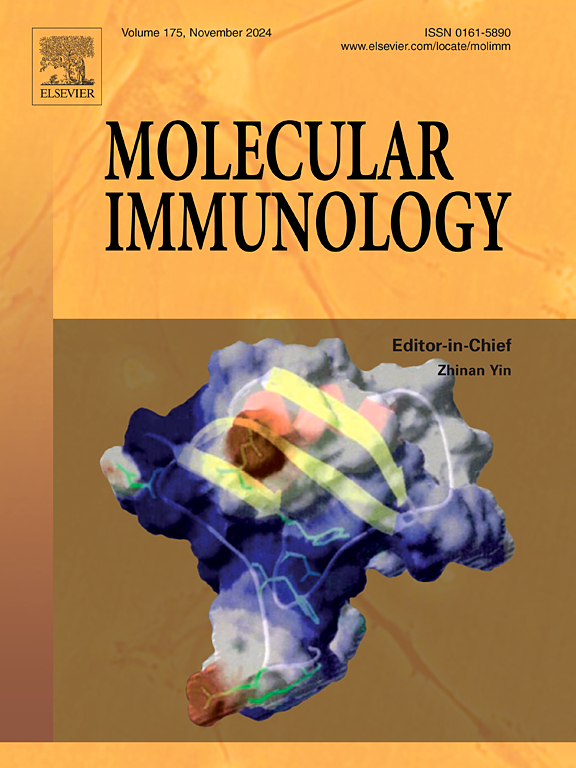甲氨蝶呤负载细胞外囊泡通过抑制ACSL1和促进抗炎巨噬细胞减轻牙周炎
IF 3
3区 医学
Q2 BIOCHEMISTRY & MOLECULAR BIOLOGY
引用次数: 0
摘要
巨噬细胞是牙周组织中重要的免疫细胞,在牙周炎的破坏和修复中起着关键作用。巨噬细胞功能的靶向调节已成为影响牙周炎进展的潜在有效途径。本研究探讨了甲氨蝶呤负载细胞外囊泡(MTX-EVs)对体内和体外炎性巨噬细胞极化的影响。在小鼠牙周炎模型中,MTX-EVs抑制牙槽骨吸收,抑制促炎巨噬细胞激活,促进抗炎巨噬细胞。在机制上,mtx - ev降低了酰基辅酶a合成酶-1 (ACSL1)的表达,在炎症期间升高。triacsin-C抑制巨噬细胞ACSL1通过促进氧化磷酸化(OXPHOS)抑制炎症表型。相反,mtx - ev可以抵消ACSL1过表达对巨噬细胞极化和代谢的影响。我们的研究结果表明,通过mtx - ev靶向ACSL1是一种调节巨噬细胞极化和改善牙周炎治疗结果的治疗策略。本文章由计算机程序翻译,如有差异,请以英文原文为准。
Methotrexate loaded extracellular vesicles attenuate periodontitis by suppressing ACSL1 and promoting anti-inflammatory macrophage
Macrophages are crucial immune cells in periodontal tissues, which play key roles in both the destruction and repair of associated with periodontitis. Targeted modulation of macrophage function has emerged as a potentially effective approach to influence periodontitis progression. This study investigates the effects of methotrexate-loaded extracellular vesicles (MTX-EVs) on inflammatory macrophage polarization both in vivo and in vitro. In a murine periodontitis model, MTX-EVs inhibited alveolar bone resorption, suppressed pro-inflammatory macrophage activation, and promoted anti-inflammatory macrophages. Mechanistically, MTX-EVs reduced acyl-CoA synthetase-1 (ACSL1) expression, which was elevated during inflammation. Inhibition of ACSL1 with triacsin-C in macrophages suppressed the inflammatory phenotype through the promotion of the oxidative phosphorylation (OXPHOS). In contrast, MTX-EVs counteracted the effects of ACSL1 overexpression on macrophage polarization and metabolism. Our findings suggest that targeting ACSL1 via MTX-EVs represents a therapeutic strategy for modulating macrophage polarization and improving periodontitis treatment outcomes.
求助全文
通过发布文献求助,成功后即可免费获取论文全文。
去求助
来源期刊

Molecular immunology
医学-免疫学
CiteScore
6.90
自引率
2.80%
发文量
324
审稿时长
50 days
期刊介绍:
Molecular Immunology publishes original articles, reviews and commentaries on all areas of immunology, with a particular focus on description of cellular, biochemical or genetic mechanisms underlying immunological phenomena. Studies on all model organisms, from invertebrates to humans, are suitable. Examples include, but are not restricted to:
Infection, autoimmunity, transplantation, immunodeficiencies, inflammation and tumor immunology
Mechanisms of induction, regulation and termination of innate and adaptive immunity
Intercellular communication, cooperation and regulation
Intracellular mechanisms of immunity (endocytosis, protein trafficking, pathogen recognition, antigen presentation, etc)
Mechanisms of action of the cells and molecules of the immune system
Structural analysis
Development of the immune system
Comparative immunology and evolution of the immune system
"Omics" studies and bioinformatics
Vaccines, biotechnology and therapeutic manipulation of the immune system (therapeutic antibodies, cytokines, cellular therapies, etc)
Technical developments.
 求助内容:
求助内容: 应助结果提醒方式:
应助结果提醒方式:


